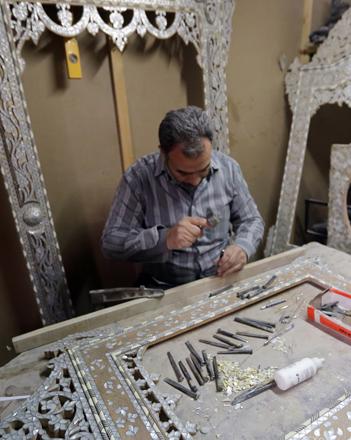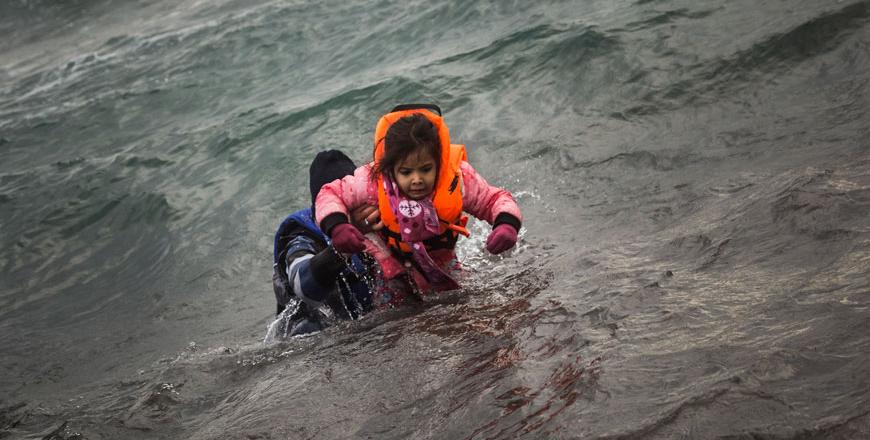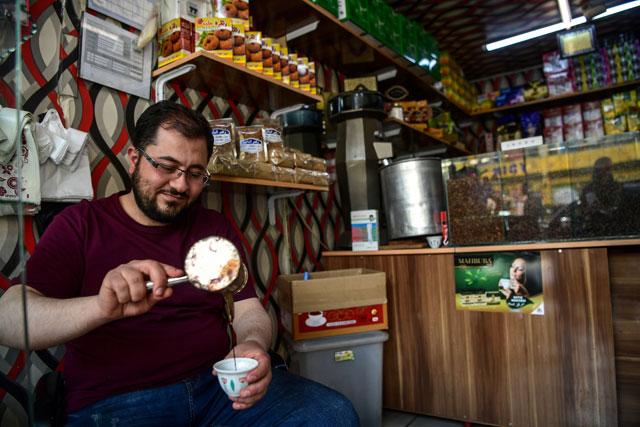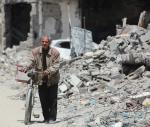You are here
In old Damascus, war threatens Syrian handicrafts
By Agencies - Jan 11,2016 - Last updated at Jan 11,2016

A Syrian artisan etches away at wooden panels inlaid with mother-of-pearl, at a workshop in Damascus on December 1, 2015 (AFP photo)
DAMASCUS — In his cramped workshop in Damascus, Mohammad Abdallah delicately etches away at wooden panels inlaid with mother-of-pearl, a craft he perfected over a decade before the outbreak of Syria's war.
As he worked, Abdallah expressed concern that his craft, the intricate process of filling carved wooden decorative pieces with shells, bone, or ivory, could be forced into "extinction" by the conflict raging across his country.
"I worry for the fate of the Damascene mother-of-pearl craft because of the lack of labour and the difficulty in acquiring and transporting raw materials," the 43-year-old said.
Like many other craftsmen, Abdallah was forced to abandon his spacious warehouse on the outskirts of Damascus when fighting broke out.
"My heart aches because the mother-of-pearl workshops in Damascus and its outskirts have dropped from 30 to only three or four workshops," he added.
His own workforce "has faded in recent years because the labourers have joined the fighting or have fled" Syria altogether.
And local purchasers, stung by the devaluation of the Syrian pound, can no longer afford the stunning designs, he continued.
Since Syria's conflict erupted in 2011, more than 260,000 people have been killed and millions have fled their homes.
But the war has also taken a toll on the country's renowned traditional craft, from ornate wooden furniture to the rich, golden stitching of its famed brocade fabrics.
Dearth of craftsmen
The artisanal designs were popular among tourists, who generated about 12 per cent of Syria's pre-war gross domestic product.
But with tourism virtually nonexistent and travel across the country growing more difficult by the day, craftsmen in Damascus are in despair.
Traditional cultural products in Syria, from songs and poetry to beautiful handicrafts, "have been completely damaged by the crisis", said Mohammad Fayyad, a researcher on cultural heritage.
"If the situation continues like this, there will be no more craftsmen" left in Syria, Fayyad told AFP.
In 2009, Syrian craftsmen registered with the national union had numbered some 18,000, alongside an estimated 39,000 who were unregistered, Fayyad indicated.
By the end of 2015, between 70 and 80 per cent had left the trade, many emigrating after the destruction of their workshops around Damascus and in the northern city of Aleppo, another handicrafts hub, according to Fayyad.
Fabric specialist Samer Al Nuqta contemplates the vibrant pieces of cloth on wooden shelves in his workshop, which dates back to 1929 and stands in the famed Hamidiyeh market's "tailor row".
He said he doesn't know what has happened to his factory in Ain Tarma, on the outskirts of Damascus.
"We haven't produced a single metre for about five years. Right now, we're selling what we had in store in the warehouse," he added.
"I will sell what we have left in store, and after that I may be forced to change my trade, which I grew up on," Nuqta continued.
Bahaa Al Takriti, who weaves the richly embroidered aghbani cloths often used as tablecloths, says his "weekly production has dropped from 60 covers to six, and sometimes only three".
"Out of six people that knew how to set the designs, only two are left," Takriti lamented.
British queen's wedding fabric
As it nears a sixth year, Syria's conflict has also diminished the production of Damascene brocade, handwoven silk fabric ornately decorated with brightly coloured thread.
Brocade became world-famous when former Syrian president Shukri Al Quwatli gifted a slot of the fabric in 1947 to the future Queen Elizabeth II, who used it as part of her wedding gown.
But few foreigners now come to Damascus to purchase the lavish cloth, and Syrian buyers can no longer afford it.
Ibrahim Al Ayubi, who has produced brocade in the Syrian capital for decades, said good quality silk is hard to come by, and anyway, the price has gone up "tenfold".
"The crisis had a really big effect on us because of the lack of tourists, who made up about 95 per cent of our customers," Ayubi indicated.
And in the corner of Ahmad Shakaki's brocade shop in Damascus, a large wooden loom stands next to a small stool made of coloured bamboo.
Narrow shelves display the elegant brocade fabric that Shakaki painstakingly produces.
"Our craft [is] essentially dependent on our sales returns, which in turn depend on tourists. Our situation is tough now, and we're working with whatever we have," Shakaki said.
"The war has made the new generation reluctant to learn the trade," he added. "I am worried that this loom will stop weaving."
Separately, Saad Chouihna believes that if you can make it in Turkey, you can make it anywhere.
"The Turkish market is the hardest," said the 28-year-old Syrian from the city of Aleppo, bemoaning the tangled bureaucracy, cut-throat competition and a business culture that depends on long-term relationships.
But armed with a knowledge of Turkish and the local culture, Chouihna is finding his way.
He has opened a branch of his family's plastics business in the southeastern city of Gaziantep, where the many Syrian restaurants and Arabic signs in some districts bear witness to the proximity of the border and the growing Syrian population.
His firm is one of nearly 2,000 set up by Syrians in Turkey in the almost five years since their homeland descended into civil war.
A quarter of a million people have been killed since then and millions more displaced, with Turkey now home to 2.2 million Syrians, the world's largest refugee population.
"Our business is plastic — that's what we know," Chouihna said. "But the established companies here have the contacts and experience locally so as a new company here it is really hard to get contacts or get contracts from big medical companies, for example. A lot of them don't even come to the phone."
But Chouihna, who has a wife and baby daughter, said he saw "no difference between me and a Turkish company" because he employs Turks as well as Syrians and pays his taxes.
Some Turks concerned
In November, Ankara promised to help stem the flow of refugees trying to reach Europe in return for $3.2 billion in aid and renewed talks on joining the European Union.
Ankara has spent more than $8.5 billion on feeding and housing Syrian refugees since the start of the war, but has yet to introduce a policy to allow them to work legally.
Echoing concerns voiced in other countries about the flow of refugees, lower-income Turks fear that Syrians, including the estimated 250,000 now working illegally in Turkey, will undercut them and take their jobs. But data suggest Syrians such as Chouihna are a boost for the Turkish economy.
According to TOBB, an umbrella body for local chambers of commerce, more than 1,000 companies were established in Turkey with at least one Syrian partner in the first seven months of 2015, compared with 30 in 2010, before the start of the war.
Although there is no estimate yet of the increase in output from these firms, economists say they have boosted trade with Syria in parts of Turkey where instability and violence in border areas have dented trade with neighbours.
"There has been a big jump in the numbers of businesses founded by Syrians probably because they are finally realising they are likely to remain in Turkey for many more years," said Esra Ozpinar, a researcher from economic think tank TEPAV.
Boost to exports
In Gaziantep, new buildings have sprung up beside the city's mediaeval fortress and old market, thanks to modern investments and economic incentives offered by the government which have helped it become an economic hub and the most industrialised city in Turkey's south.
Chouihna exports to Egypt, Lebanon, Romania, Tunisia and Yemen and does some trade in Turkey. He also sells his products in Syria, helping Turkey's exports to its neighbour get back close to their pre-war levels.
Turkish exports to Syria dipped in 2011 and 2012, but have recovered significantly.
In the first 10 months of 2015, Turkey exported $1.3 billion in goods and services there, according to the Turkish Statistical Institute, compared to less than half a billion dollars in 2012.
TEPAV research suggests the rising number of Syrian firms in border provinces such as Kilis, Mardin and Hatay has helped the recovery in exports. But their composition has changed, reflecting the needs of a war economy, with food, generators and pickup trucks eclipsing building materials and cars.
According to economist Harun Ozturkler of the Centre For Middle Eastern Strategic Studies in Ankara, these businesses could in the long term be crucial to the Turkish economy.
"The most important contribution will be their network in the Arab world because the owners of these firms were merchants in Syria," he indicated. "Finding new markets for Turkey is going to be the most important."
But there is animosity in Gaziantep among some businessmen who see firms like Chouihna's as a threat.
"We know there are many unregistered firms and they cause unfair competition," said the chamber's communications chief, Senay Copur.
"The advantage is they [Syrian firms] are serving generally their own citizens and create employment opportunities," she said, adding that efforts were under way to bring such companies into the tax system.
Chouihna said the authorities turn a blind eye to his Syrian staff since he also employs some Turks, but he would rather they were officially documented.
Another Syrian living in Gaziantep, Abu Tareq, said he had found investors for his plan to start a company producing $1 million worth a year of refrigerators for restaurants, food stores and factories.
He plans to base his firm in the same industrial district as Chouihna's and intends to hire 14 people, the majority of whom will be Syrian, he added.
After working in the same business in Syria, he saw an opportunity in the Turkish market.
"There are business options here for Syrians and I realised I will be here for a long time," he said.
Related Articles
GAZIANTEP, Turkey — Sitting in the bare office above his factory where thousands of baby rattles and plastic bottles are cranked out every h
Gaziantep, Turkey — In the Turkish city of Gaziantep, home to around half a million Syrians who fled the civil war south of the border
DAMASCUS, Syria — On a rooftop in Syria's capital, Mohammad Al Rihawi plunges silk threads into emerald green dye, preparing it to be woven


















